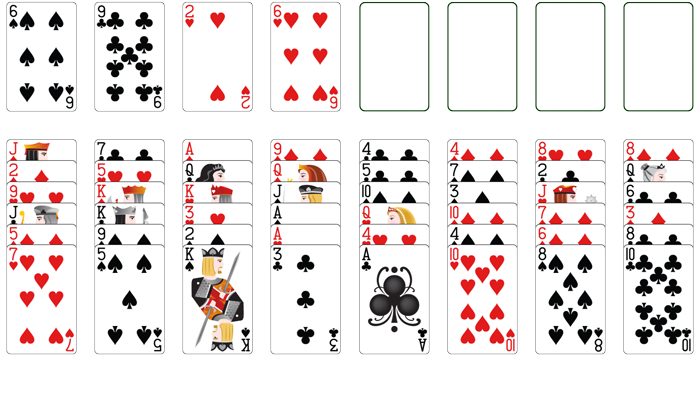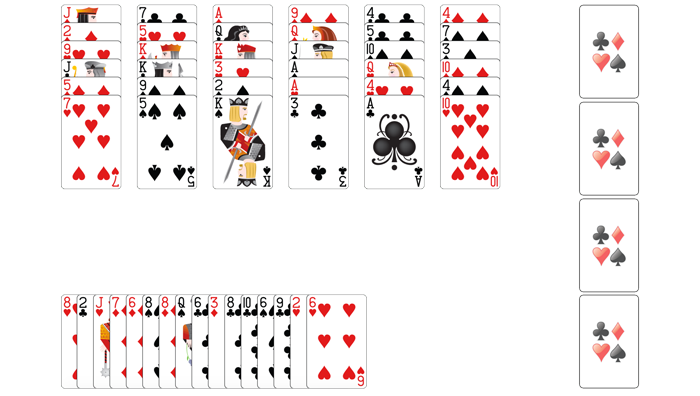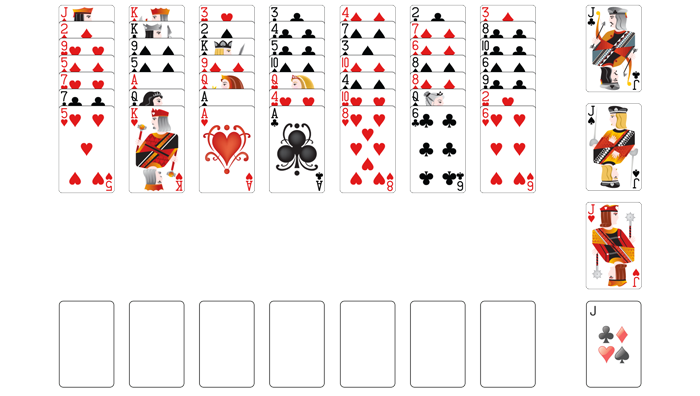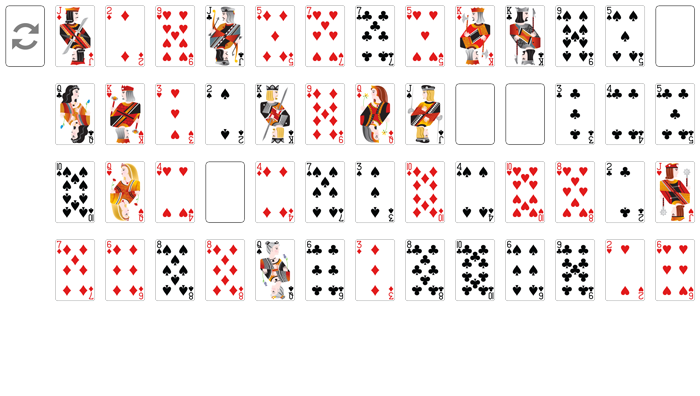FreeCell is a strategy game that depends on the player's thinking and planning.
Move all cards to the foundations.
An interesting fact about FreeCell is that only a few games have no solution. Thus, you will only be stuck in a game if you adopt a bad strategy. The following numbers were taken from the website FreeCell solutions.
The following puzzles are extremely easy, so you won't have to think too hard to solve them: #25904, #5152, #11987, #13464, #9998, #62090, #1529, #38168, #41426, and # 41993.
Here are some easy games: #164, #892, #1012, #1081, #1150, #1529, #2508, #32016, #33624, #33710, #33949, #34898, and #37509.
If you want a challenge, here's a list of games that necessarily use all empty cells: #169, #178, #285, #454, #575, #598, #617, #657, #775, #32123, #32379, #32469, #32483, #32549 and #32687.
FreeCell emerged from a variation of the game Baker's Game (not to be confused with the game Baker's Dozen, Baker's Dozen). In Baker's Game the cards must be organized in descending order and with the same suit, while in FreeCell the cards are organized in descending order and with alternating colors.
The game became famous when it was included in Windows 95 and kept in later versions of Microsoft's operating system, being removed in Windows 8. In Windows XP, the game was modified to present a total of 1 million different card distributions (different games).

Eight Off is a solitaire game from the FreeCell family.

Solitaire game in which each card is considered a flower and it takes skill to win.

It is a game that does not rely on luck and is similar to Eight Off Solitaire and FreeCell.

Use the available gaps to sort the cards in the four rows.
Solitaire, a game often seen as a simple diversion, holds within its ordered world a profound lesson in mindfulness and the art of delayed gratification. The solitary nature of the game encourages a player to be fully present in the moment, focusing on the cards, the possible moves, and the strategies to be employed. This singular concentration fosters a state of mindfulness, where external distractions fade away, allowing the player to engage in a form of active meditation. The rhythmic pattern of sorting and organizing the cards becomes a practice in patience and attentiveness, as one must remain aware of the present game state while also anticipating future moves. In this way, Solitaire trains the mind to be observant and deliberate, qualities that are essential for mindfulness.
Furthermore, Solitaire is not a game of instant rewards; it teaches players the value of delayed gratification. Unlike fast-paced games that offer immediate rewards and constant stimulation, Solitaire requires a player to work through the deck patiently, with the understanding that success may not be immediate. This pacing ensures that when victory comes, it is the result of persistence and the ability to delay the desire for an immediate outcome. In a world that often prioritizes instant gratification, Solitaire stands out as a bastion for the slower, more rewarding experience. It instills in players the understanding that some rewards are worth the wait, and that the satisfaction derived from achieving a goal is heightened by the effort and time invested in reaching it.
Solitaire, a game often associated with leisurely pastime, has found its place as a cogent tool in the arsenal for promoting elderly brain health. As individuals age, the importance of maintaining cognitive agility becomes paramount, and Solitaire offers a readily accessible means to engage the brain in a range of mental exercises. The game's requirement for pattern recognition, strategic planning, and memory recall exercises key areas of the brain involved in cognitive preservation. Regular engagement in Solitaire can help older adults keep their minds sharp, potentially staving off the cognitive decline that can accompany aging. It's not just about moving cards, but rather about stimulating neural pathways, enhancing mental speed, and preserving the brain's plasticity, which are crucial for sustaining a high quality of cognitive function in the later years of life.
Moreover, Solitaire's inherent flexibility as a game that can be played both traditionally with cards or digitally on various devices adds to its appeal for the elderly, offering a comfortable and familiar interface to engage with technology. This intersection of traditional game mechanics with modern technology not only bridges generational gaps but also encourages a form of mental training that is both effective and enjoyable. The simplicity of Solitaire, requiring no complex rules or physical exertion, makes it an ideal brain exercise for the elderly, providing a gentle yet effective workout for the mind. By regularly arranging decks, sequencing suits, and solving layouts, elderly players can sharpen their mental faculties, potentially enhancing their daily functioning and prolonging their cognitive health.